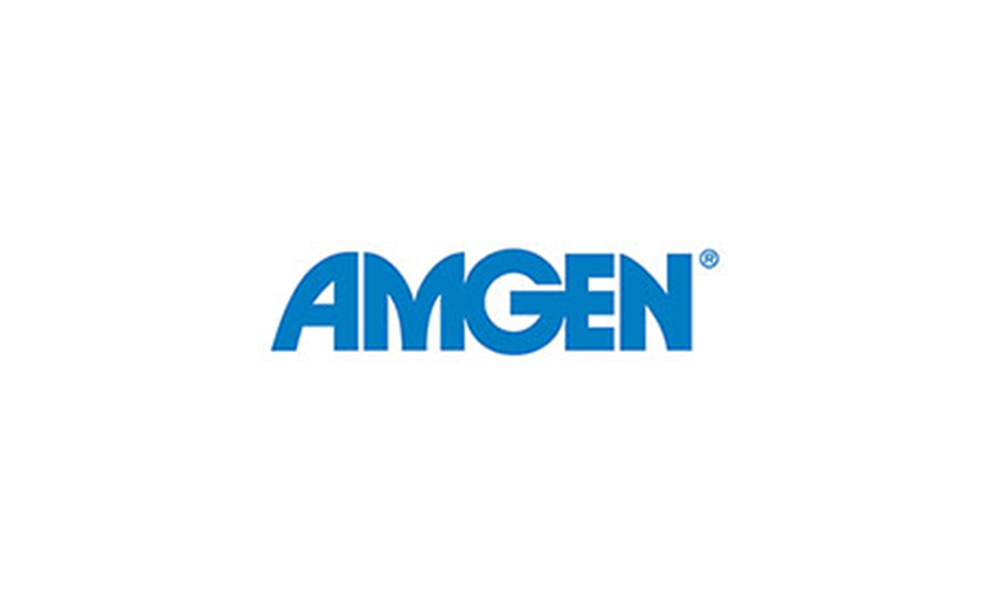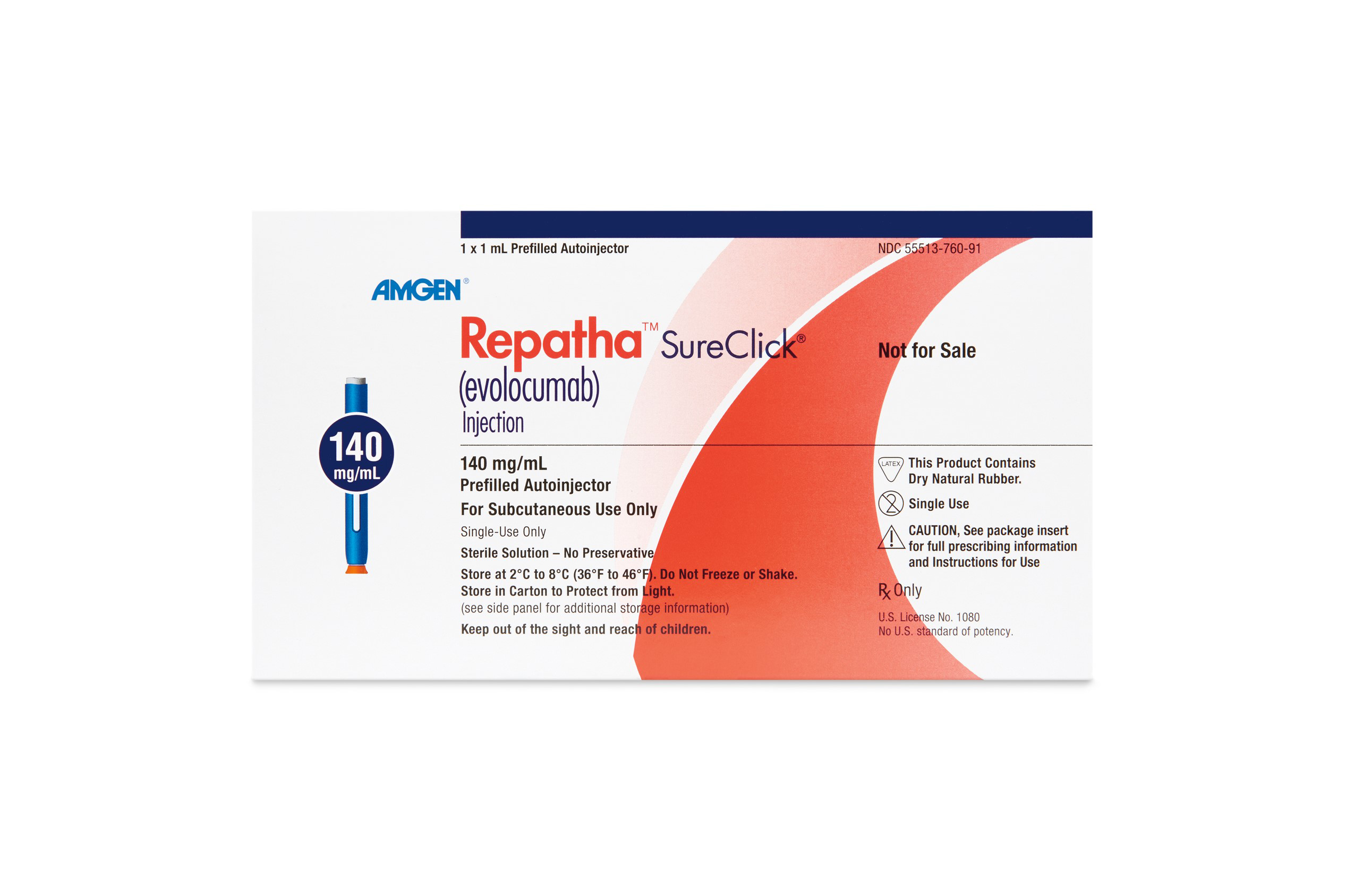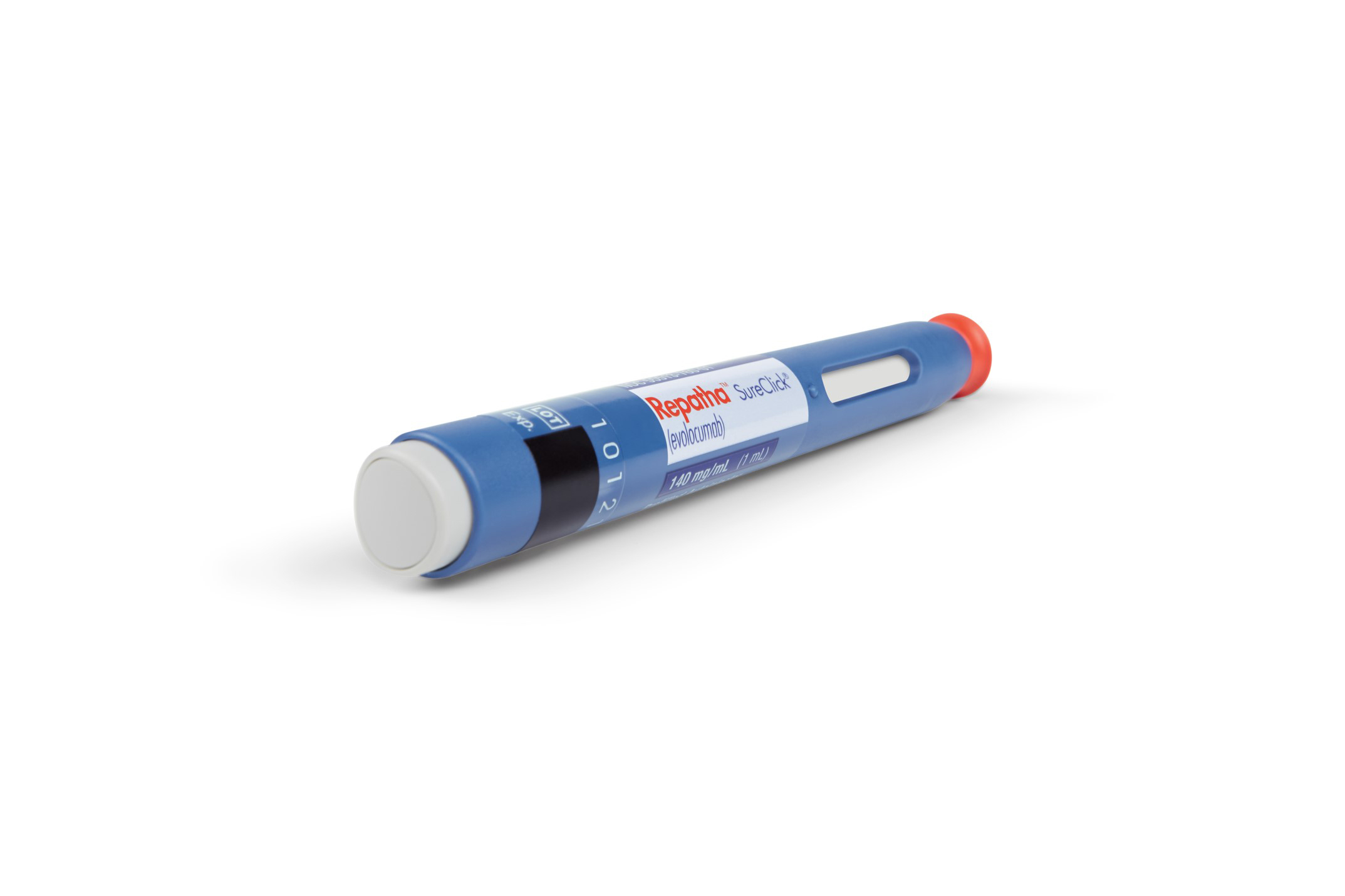Amgen Makes Repatha® (Evolocumab) Available In The US At A 60 Percent Reduced List Price
10.24.2018
|
To view the Multimedia News Release, go to: https://www.multivu.com/players/English/8004559-amgen-repatha-reduced-list-price/.
"Cardiovascular disease is one of the country's most significant health challenges, and every 40 seconds someone in America has a heart attack or stroke," said
Bradway noted that an estimated 75 percent of
"Since turning 65 and going on Medicare I have had to make one of the hardest decisions of my life – can I afford to stay on Repatha, the only thing, even after nine stents and numerous statins, that has worked to lower my cholesterol?" says Repatha patient Bob C. from
Today's action reflects the Company's active participation in the
"This is a unique solution for a unique situation," said
Throughout 2018,
"Unfortunately, higher rebates don't typically result in lower out-of-pocket costs for patients, especially for
To allow for a smooth transition to these lower-priced options,
"While we hope more patients will benefit from swift adoption of these lower-priced options, it is ultimately a payer decision," Gordon said.
"At Express Scripts, our goal is to ensure affordability and ensure patients get the novel medicines they need," said
Patients or physicians who need help understanding these changes can contact RepathaReady® (1-844-REPATHA). The RepathaReady program provides a comprehensive suite of services to help patients and providers, including a Repatha
Elevated "bad cholesterol" or low-density lipoprotein cholesterol (LDL-C) is one of the most important modifiable risk factors for heart attack and stroke prevention. According to a recent Centers of Disease Control (CDC) report, 39 million adults could benefit from managing their cholesterol. Within this population, patients with established cardiovascular disease are at greatest risk for heart attack and stroke.
Live audio of the investor call will be simultaneously broadcast over the Internet and will be available to members of the news media, investors and the general public.
The webcast, as with other selected presentations regarding developments in
Repatha Cardiovascular Outcomes (FOURIER) Study: Key Outcomes
The 27,564-patient Repatha cardiovascular outcomes study (FOURIER) demonstrated that adding Repatha to optimized statin therapy resulted in a statistically significant 20 percent (p<0.001) reduction in major adverse cardiovascular events (MACE) represented in the key secondary composite endpoint of time to first heart attack, stroke or cardiovascular death. The study found a statistically significant 15 percent reduction (p<0.001) in the risk of the primary composite endpoint, which included hospitalization for unstable angina, coronary revascularization, heart attack, stroke or cardiovascular death.
The magnitude of risk reduction in both the primary and key secondary composite endpoints grew over time, with the robust benefit starting as early as six months and accruing through the median 2.2 years of the study.
Patients on Repatha experienced a reduction in the risk of heart attack (27 percent, nominal p<0.001), stroke (21 percent, nominal p=0.01) and coronary revascularization (22 percent, nominal p<0.001). Consistent with recent trials of more intensive LDL-C lowering, there was no observed effect on cardiovascular mortality. Similarly, there was no observed effect on hospitalization for unstable angina.
The safety profile of Repatha in the outcomes trial was generally consistent with the safety profile for the 12- and 52-week controlled trials involving patients with primary hyperlipidemia, including heterozygous familial hypercholesterolemia (HeFH). Common adverse reactions included diabetes mellitus, nasopharyngitis, and upper respiratory tract infection.
Repatha Cardiovascular Outcomes (FOURIER) Study Design
FOURIER (Further Cardiovascular OUtcomes Research with PCSK9 Inhibition in Subjects with Elevated Risk), a multinational Phase 3 randomized, double-blind, placebo-controlled trial, is designed to evaluate whether treatment with Repatha in combination with statin therapy compared to placebo plus statin therapy reduces cardiovascular events. The primary endpoint is the time to cardiovascular death, myocardial infarction, stroke, hospitalization for unstable angina, or coronary revascularization. The key secondary endpoint is the time to cardiovascular death, myocardial infarction or stroke.
Eligible patients with high cholesterol (LDL-C ≥70 mg/dL or non-high-density lipoprotein cholesterol [non-HDL-C] ≥100 mg/dL) and clinically evident atherosclerotic cardiovascular disease at more than 1,300 study locations around the world were randomized to receive Repatha subcutaneous 140 mg every two weeks or 420 mg monthly plus effective statin dose; or placebo subcutaneous every two weeks or monthly plus effective statin dose. Optimized statin therapy was defined as at least atorvastatin 20 mg or equivalent daily with a recommendation for at least atorvastatin 40 mg or equivalent daily where approved. The study was event-driven and continued until at least 1,630 patients experienced a key secondary endpoint.
About Repatha® (evolocumab)
Repatha® (evolocumab) is a human monoclonal antibody that inhibits proprotein convertase subtilisin/kexin type 9 (PCSK9). Repatha binds to PCSK9 and inhibits circulating PCSK9 from binding to the low-density lipoprotein (LDL) receptor (LDLR), preventing PCSK9-mediated LDLR degradation and permitting LDLR to recycle back to the liver cell surface. By inhibiting the binding of PCSK9 to LDLR, Repatha increases the number of LDLRs available to clear LDL from the blood, thereby lowering LDL-C levels.
Repatha is approved in more than 60 countries, including the U.S., Japan, Canada and in all 28 countries that are members of the European Union. Applications in other countries are pending.
U.S. Repatha Indication
Repatha is a PCSK9 (proprotein convertase subtilisin kexin type 9) inhibitor antibody indicated:
- to reduce the risk of myocardial infarction, stroke, and coronary revascularization in adults with established cardiovascular disease.
- as an adjunct to diet, alone or in combination with other lipid-lowering therapies (e.g., statins, ezetimibe), for treatment of adults with primary hyperlipidemia (including heterozygous familial hypercholesterolemia [HeFH]) to reduce low-density lipoprotein cholesterol (LDL-C).
- as an adjunct to diet and other LDL-lowering therapies (e.g., statins, ezetimibe, LDL apheresis) in patients with homozygous familial hypercholesterolemia (HoFH) who require additional lowering of LDLC.
The safety and effectiveness of Repatha have not been established in pediatric patients with HoFH who are younger than 13 years old or in pediatric patients with primary hyperlipidemia or HeFH.
Important U.S. Safety Information
Contraindication: Repatha® is contraindicated in patients with a history of a serious hypersensitivity reaction to Repatha®. Serious Hypersensitivity reactions including angioedema have occurred in patients treated with Repatha®.
Allergic reactions: Hypersensitivity reactions (e.g. angioedema, rash, urticaria) have been reported in patients treated with Repatha®, including some that led to discontinuation of therapy. If signs or symptoms of serious allergic reactions occur, discontinue treatment with Repatha®, treat according to the standard of care, and monitor until signs and symptoms resolve.
Adverse Reactions in Primary Hyperlipidemia (including HeFH): The most common adverse reactions (>5% of patients treated with Repatha® and occurring more frequently than placebo) in clinical trials were: nasopharyngitis, upper respiratory tract infection, influenza, back pain, and injection site reactions.
From a pool of the 52-week trial and seven 12-week trials: Local injection site reactions occurred in 3.2% and 3.0% of Repatha®-treated and placebo-treated patients, respectively. The most common injection site reactions were erythema, pain, and bruising.
Allergic reactions occurred in 5.1% and 4.7% of Repatha®-treated and placebo-treated patients, respectively. The most common allergic reactions were rash (1.0% versus 0.5% for Repatha® and placebo, respectively), eczema (0.4% versus 0.2%), erythema (0.4% versus 0.2%), and urticaria (0.4% versus 0.1%).
Adverse Reactions in the Cardiovascular Outcomes Trial: The most common adverse reactions (>5% of patients treated with Repatha® and occurring more frequently than placebo) were: diabetes mellitus (8.8% Repatha®, 8.2% placebo), nasopharyngitis (7.8% Repatha®, 7.4% placebo), and upper respiratory tract infection (5.1% Repatha®, 4.8% placebo).
Among the 16,676 patients without diabetes mellitus at baseline, the incidence of new-onset diabetes mellitus during the trial was 8.1% in patients assigned to Repatha® compared with 7.7% in those assigned to placebo.
Adverse Reactions in Homozygous Familial Hypercholesterolemia (HoFH): The adverse reactions that occurred in at least two patients treated with Repatha® and more frequently than placebo were: upper respiratory tract infection, influenza, gastroenteritis, and nasopharyngitis.
Immunogenicity: Repatha® is a human monoclonal antibody. As with all therapeutic proteins, there is potential for immunogenicity with Repatha®.
Please contact Amgen Medinfo at 800-77-AMGEN (800-772-6436) or 844-REPATHA (844-737-2842) regarding Repatha availability or find more information, including full Prescribing Information, at www.amgen.com and www.Repatha.com.
About Amgen in the Cardiovascular Therapeutic Area
Building on more than three decades of experience in developing biotechnology medicines for patients with serious illnesses, Amgen is dedicated to addressing important scientific questions to advance care and improve the lives of patients with cardiovascular disease, the leading cause of morbidity and mortality worldwide. Amgen's research into cardiovascular disease, and potential treatment options, is part of a growing competency at Amgen that utilizes human genetics to identify and validate certain drug targets. Through its own research and development efforts, as well as partnerships, Amgen is building a robust cardiovascular portfolio consisting of several approved and investigational molecules in an effort to address a number of today's important unmet patient needs, such as high cholesterol and heart failure.
About
For more information, visit www.amgen.com and follow us on www.twitter.com/amgen.
Forward-Looking Statements
This news release contains forward-looking statements that are based on the current expectations and beliefs of
Our results may be affected by our ability to successfully market both new and existing products domestically and internationally, clinical and regulatory developments involving current and future products, sales growth of recently launched products, competition from other products including biosimilars, difficulties or delays in manufacturing our products and global economic conditions. In addition, sales of our products are affected by pricing pressure, political and public scrutiny and reimbursement policies imposed by third-party payers, including governments, private insurance plans and managed care providers and may be affected by regulatory, clinical and guideline developments and domestic and international trends toward managed care and healthcare cost containment. Furthermore, our research, testing, pricing, marketing and other operations are subject to extensive regulation by domestic and foreign government regulatory authorities. Our business may be impacted by government investigations, litigation and product liability claims. In addition, our business may be impacted by the adoption of new tax legislation or exposure to additional tax liabilities. Further, while we routinely obtain patents for our products and technology, the protection offered by our patents and patent applications may be challenged, invalidated or circumvented by our competitors, or we may fail to prevail in present and future intellectual property litigation. We perform a substantial amount of our commercial manufacturing activities at a few key facilities, including in
CONTACT: Amgen, Thousand Oaks





![]() View original content:http://www.prnewswire.com/news-releases/amgen-makes-repatha-evolocumab-available-in-the-us-at-a-60-percent-reduced-list-price-300737367.html
View original content:http://www.prnewswire.com/news-releases/amgen-makes-repatha-evolocumab-available-in-the-us-at-a-60-percent-reduced-list-price-300737367.html
SOURCE
